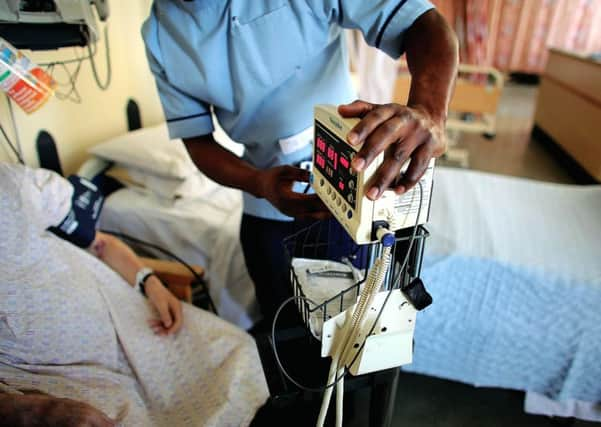Leader: SNP has the power to properly resource NHS


Politicians of all parties rush to proclaim their commitment to the health service. During every election campaign in living memory, the argument over who would make the wisest custodians of the NHS has played a central part. During 2014’s independence referendum campaign, both Yes and No campaigns proclaimed that only their preferred result would ensure the NHS continued to thrive.
But the truth is that the Scottish NHS is ailing and has been for some time.
Advertisement
Hide AdAdvertisement
Hide AdNew figures obtained by Scottish Labour show that more than 130,000 patients were treated in the wrong wards over the past two years, while First Minister Nicola Sturgeon’s announcement last week that the Scottish Government is to make available £27 million – to employ 500 more nurses and create 50 new places in medical schools – while welcome, represented a clear recognition of existing ills in the NHS.
Labour’s revelation about so-called “boarding out” should give us all cause for concern. Treating patients in wards set up to specialise in conditions other than those they are suffering is, according to a Scottish Government study, likely to expose them to a greater risk of dying, and make it more likely they will spend longer in hospital or be readmitted after being sent home.
It is undoubtedly true that not every problem affecting public services can be solved with money alone, but given that staff shortages are at the root of much of what is now wrong with the Scottish NHS, more financial investment is needed if the currently expected level of service is to be provided.
This fact raises the question of where that money is going to come from.
Scottish Labour leader Kezia Dugdale recently proposed that new powers, soon to be handed to Holyrood, should be used to raise income tax by a penny in the pound. For her troubles, Dugdale was shouted down by ministers who, while certainly talking a good game on being opposed to “austerity”, remain unwilling to ask voters to pay a little more for the services upon which so many depend.
It is certainly the case that voters are rarely enthused by the prospect of paying more tax, but if we truly value the NHS, this is a discussion that must be had. As we move towards May’s Holyrood election, we’d like this conversation to begin. Hoping for greater investment in the NHS while refusing to contemplate how this might be achieved is naive at best.
The Labour Party’s tax proposal was dismissed out of hand, when a debate was appropriate.
We are bound to point out that the SNP has more political capital than any other party in the UK. The First Minister could quite easily take the step of raising tax to increase NHS funding and retain her thumping lead in the opinion polls. Sturgeon proudly describes herself as a progressive politician. In finding a long-term solution to the problem of NHS underfunding through a minimal rise in tax, she could demonstrate that.
Advertisement
Hide AdAdvertisement
Hide AdOur politicians seem incapable of seriously debating the NHS and its problems. Opposition members who raise concerns are, as a matter of course, accused of somehow attacking or undermining those who work in the service. This facile response is simply not good enough.
In this year’s Holyrood campaign we can expect the major political parties to make bold promises about the NHS under their stewardship. The truth is, however, that a debate about what we expect from the health service and what we are willing to pay for it is long overdue.